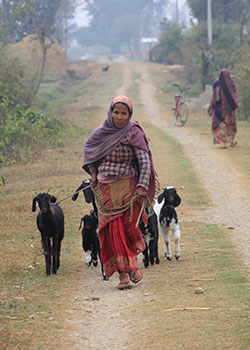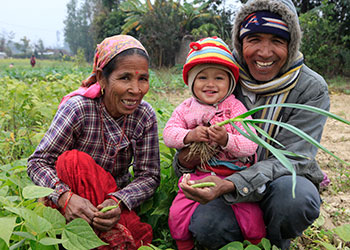Story by Christian DeVries | Freelance Writer | Heifer International
Photos by Russ Powell | Freelance Photographer | Heifer International
 |
Bhumi Kumari Kathait walks a herd of goats to her home. |
It is often impossible to find steady employment in rural communities around the globe. Every year millions of people leave their families to find work elsewhere. This migration from rural areas erodes family connections and village unity.
This was the case for 14 years for Bhumi Kumari Kathait, 49, whose husband, Bal Bhadhur Kathait, also 49, left their home in a Nepal village to find work in India.
Life was extremely difficult for Bhumi and her family. They lived in a tiny mud hut with a leaky thatched roof. They ate only two meals a day, typically rice with lentils or spinach, and ate meat only 8-10 times a year.
Tears shimmer in her eyes as she recalls those painful years. “I was constantly worried about how to feed my children. I thought that I’d never know happiness,” she said.
Bal remembers, too. His family seemed to be poorest in their village, and he could never save up enough money to get his family out of poverty. He spent up to 10 months a year in India. However, Bhumi would always run out of money before he came home again.
To earn more income for her family, Bhumi worked as a day laborer or plowed other people’s fields with their ox. Bhumi worked 21 hours a day, with only three hours of sleep.
Everything changed when Bhumi joined a Heifer project about five years ago. She received trainings in kitchen gardening, fodder and forage, improved animal management, Heifer’s 12 Cornerstones for Just and Sustainable Development, reproductive health and HIV/AIDS.
In 2008, she received two goats, fodder seeds, and tomato and chili seeds. Just a year after joining the project, she built a new house. A year later, she completed her Passing on the Gift® requirement, and Bal was able to stay home. Bal said, “I noticed that people in the project were doing better by staying here rather than going abroad, so I decided to stay.”
 |
Bhumi Kumari Kathait and her husband Bal Bhadhur Kathait, pose with their grandchild Hemanta Bhadhur Kathait in the family garden. |
With a smile, Bhumi lightheartedly disagreed with him. “I didn’t let him go back to India because there is a lot of work to be done here.”
Her success has given Bhumi a voice in the decisions made at home and a new sense of self-worth.
“I have more facilities and comfort at home now because my husband is here to help me,” Bhumi said. “Our lifestyle is very comfortable now.”
They now earn money from selling vegetables and milk, and their eldest son sends money home. Thanks to Heifer’s training and the manure from their animals, Bhumi is able to harvest a steady stream of vegetables from their small garden.
“Our financial condition was very bad,” said Bhumi, but she learned from her favorite Cornerstones, "Improved Animal Management" and "Nutrition and Income." “From these Cornerstones I learned how to increase my income level.”
Bhumi is impressed by all the trainings Heifer provided. She said other organizations came and went, but Heifer’s assistance has made a lasting impact. “I learned new skills and knowledge about our own health through this project,” she said. “The other organizations did not give trainings.”
Bhumi participated in a number of field trip and exchange visits. “I visited places that I never could have visited before,” Bhumi said. “I saw other women raising livestock in an improved method and growing their own vegetables. I learned that I could grow vegetables and provide a better diet, as well as sell them to increase our income level. I want to visit other women’s groups and learn from them. I want to take my husband with me.”
Now Bhumi and her family eat three meals a day, and have meat three to four times in a week. “Whenever we are hungry now we can eat,” Bhumi said.
Their typical meal now consists of rice, lentils, vegetables, chutney and milk after dinner. “Before I would feel weak and had to take medicines,” Bhumi said. “Now even though I look thin I’m very strong.”
Bhumi isn’t the only woman in this project whose life has gotten better. “The women are happier now because there is more cooperation with the males in their family,” she said. When the project first started, some of the men didn’t want their wives to attend the meetings. A few of the women were even beaten. “The men didn’t understand the importance of this project and the trainings,” she said.
Bal and Bhumi recognize that this project has improved their relationship. When they could barely pay for things, there was a lot of tension. “Our relationship has changed. There is more cooperation and understanding, as well as more love,” Bhumi said. Although they are both still busy, “We now share the work between us,” Bal said. Heifer is building stronger, more loving families who are creating vibrant communities.